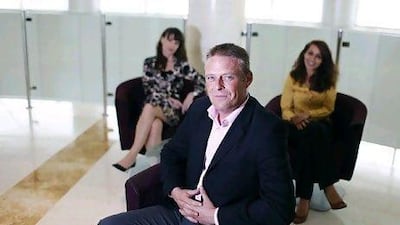When Wayne Davies commissioned a survey involving women executives at General Electric (GE) to find out how to best help them progress, he assumed they would want to.
He was wrong.
Although almost every one said their career was important, just 42 per cent said they wanted to climb the career ladder.
Mr Davies, GE's human resources director for the Middle East, North Africa and Turkey, immediately set about trying to find out why.
He organised a special session in Dubai, inviting 120 female GE middle managers from across the region who took part in the survey. He is also brought in about 20 men from within the company and another 30 women from outside organisations.
"As we got into the nuts and bolts of the survey, we learnt a couple of things," he says.
"Men and women are motivated by different things and that's not something we tend to talk about too often," adds Mr Davies, who will speak about the topic at IIR Middle East's Human Resource Summit and Expo taking place in Dubai in November.
The results showed that the men, who took part, were motivated by money, power, status and promotions, while women were more interested in a sense of achievement, and attaining a work-life balance.
Based on a man's definition of success, they did not want to progress.
"The caveat was it is based on the employee value proposition today, today's terms," says Mr Davies.
The women wanted initiatives such as contemporary flexible working policies, and consistency across all countries for maternity benefits, so Mr Davies set about drawing up policies to make GE more female friendly.
They included live Web chats among women, flexible working hours, more generous maternity allowances than the law here demands and the introduction of female mentors for senior male leaders.
"About 17 senior leaders have [been] assigned a female reverse mentor [to coach] them with what women want and need," says Mr Davies.
Sandra Aziz, who is the commercial quality leader in Dubai for GE Energy, joined the company as an intern seven years ago and worked her way up. She will mentor an executive in the aviation arm of the company.
"Not everybody has wives who are working or are aware of such conditions, so I think this is a very good opportunity to have that frank discussion with the male leaders," she says.
"They are the ones who can really shake things up," adds Ms Aziz, who took part in the survey.
She was surprised by the news that fewer than half of her female colleagues shared her ambition to advance. But she is confident the initiatives will help encourage more to want to do so.
And Mr Davies hopes they will also help fulfil another aim of the survey - to attract more women into GE.
He worked on a project involving women's advancement in London with the financial services arm of the company but faced a different challenge.
About 70 per cent of staff in that division were women but they were mostly working in the lower ranks.
Here, just 13 per cent of GE's 4,200 employees in the region, which includes Africa and Turkey, are women but they are evenly spread throughout the different levels of the organisation.
"It's something that's really, really important to me," he says.
But he admits the quest is driven by a business objective.
"The more diverse your team the more balanced it will be, the inputs it will have, the more entrepreneurial. This goes way beyond something that's nice to do and really gives us a competitive advantage," says Mr Davies.
twitter: Follow and share our breaking business news. Follow us
iPad users can read the digital edition of business section as it was printed via our e-reader app. Click here


